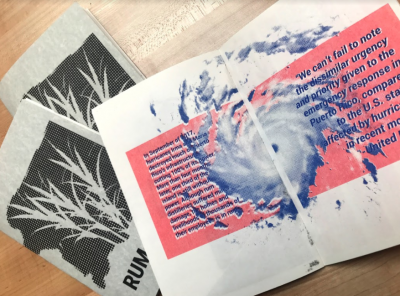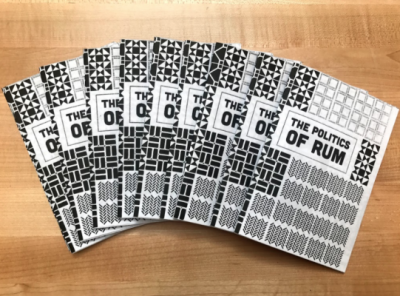Interview: AICAD Fellow Juan Carlos Rodriguez Rivera

Juan Carlos Rodriguez Rivera worked with his students to develop zines that critique the United States’ infuence on Puerto Rican land following Hurricane Maria. Students: Rachel Haeseker, Jennifer Wang, Sara Pelaez, Blake Stevenson & Ayla O’Brien.
Posted below is an interview conducted by Rochelle Spencer with current AICAD Fellow at California College of the Arts, Juan Carlos Rodriguez Rivera. In it he discusses art and design and its roots in colonization, Puerto Rico as a space for the reevaluation of Eurocentric perspectives in design, and socially conscious work generated with his students.
RS: Tell me about your lecture, “Decolonizing & Design: A Boriqueer Perspective.” What do you want your audience to gain from the talk?
JCRR: Each one of us has a relationship with colonization. I want the audience to look at their relationship with the concepts of colonization and decolonization. Healing, cultural appropriation, sustainability… what does this concepts mean to you and how do they relate to your practice.
My goal is to start a conversation on how do we start decolonizing our art and design practices. As a designer, the way I saw design was from an eurocentric/modernist perspective, from what I learned in school, but it wasn’t until I started looking into my own island aesthetics, my grandmas house decoration, my queerness that I started questioning how I approach design.
RS: #myculturalname and your alter to Juan Gabriel reference technology, and some of the work in HOME also relies upon media/technology. How do you think diverse or marginalized communities are using or incorporating technology into contemporary art?
JCRR: First, I think marginalized communities have little access to media/technology but we are doing great things with it. For example, in Puerto Rico after hurricane Maria telecommunications were destroyed for weeks in the island. The boricua diaspora would use Facebook groups to ask for their loved ones, it became this some sort of old school news where people give updates depending if they were able to reach anyone either via email, phone, etc. I think in politics and decolonization marginalized community are utilizing media/technology to create communities and being able to get our experiences out there, even if it’s just a little bit.
RS: In “Everyday Philosophy,” you’ve created images reacting to the philosophers Kant, Hegel, and Nietzche. Why did you choose those philosophers? Are you trying to disrupt or rewrite philosophical traditions? What traditions influence your past and current work?
JCRR: I chose them based on how their theories argue with each other and then I was trying to answer the question “how do I argue/talk to them as well”. Philosophy wasn’t a thing that I grew up learning about and my dad always say that you learned the most on the streets and on everyday life. That’s what I wanted to communicate with theses pieces, utilizing sarcasm in order to communicate what I considered “everyday philosophy”.
One poster says “the one that created the rules, created cheating” and the other says “beautiful, everything seems beautiful to me”. With these two quotes I just wanted to challenge the philosophers.
RS: You write, “In this era of digitization we are constantly bombarded or bombarding ourselves with visual information.” What’s the effect of this bombardment? Does being able to hear and see new stories allow us to understand each other, or as #myculturalname may suggest, does it make it easier for us to categorize and divide?
JCRR: I think my biggest worry is that we are bombarded with so much visual information that I wonder if we are even processing it. I think we are producing a lot more than what we are able to consume. I like to speculate that in all these exaggerated visual communication production there will be discoveries that we won’t get to see. Discoveries that probably two or three generations from now will discover.
RS: What do you hope to accomplish during your AICAD fellowship?
JCRR: Well, during my first year I accomplished goals that I didn’t expect to. I design and taught a Decolonization and Design in Puerto Rico class, where we studied Puerto Rico’s colonial history and we challenged eurocentric perspectives in design. In addition to teach this class again, for next year I want to keep developing projects about decolonization as it relates to Puerto Rico.
RS: Have you faced resistance, when you talk about colonization?
JCRR: I had a student, from China, who was initially resistant to these conversations. But during the semester, as we talked about how everyone has a relationship to colonization and the importance of understanding that relationship, her opinion changed. At the end of the semester, she thanked me and said she really appreciated the course.
RS: Can you tell me about the zines that you created with your students?
JCRR: Two groups of students examined a topic—food—in Puerto Rico. One group looked at rum, and the other examined sugar. The students investigated how genetically modified organisms (GMOs) have affected Puerto Rico.
The United States has tested the GMOs in Puerto Rico, and it’s affected the soil, and it has only grown worse since Hurricane Maria. The chemicals have spread through air, from farm to farm. The students’ zines attempt to give a voice to the people affected.
Bio: Rochelle Spencer is the author of AfroSurrealism: The African Diaspora’s Surrealist Fiction (Routledge 2018), co-editor, with Jina Ortiz, of All About Skin: Short Fiction by Women of Color (Univ. of Wisconsin Press, 2014), a member of the National Book Critics Circle, and a former board member of the Hurston Wright Foundation. Rochelle’s work appears or is forthcoming in Poets and Writers, the African American Review, The Women’s Review of Books, Mosaic, Publishers Weekly, Callaloo, VIDA, Crab Creek Review, and Easy Street.
